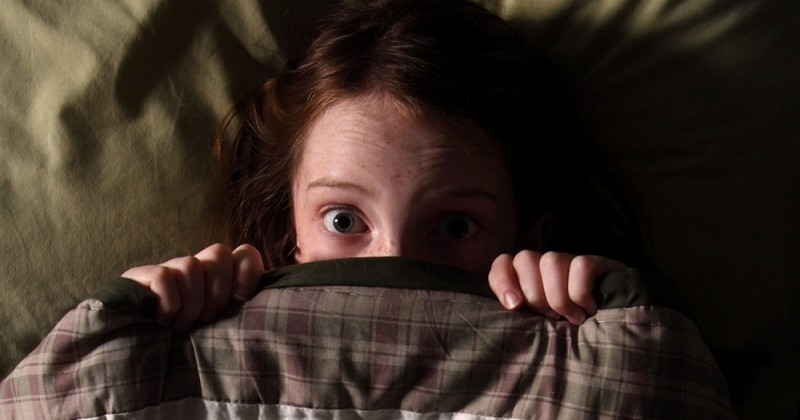Hypnic myoclonus: what are they and why do they appear?

This phenomenon appears when we feel a sudden sensation of vertigo just before falling asleep.
We are peacefully asleep and, suddenly, we feel that we fall out of bed or from the place where we are, we feel that we fall out of bed or out of the place where we are resting.. However, when we open our eyes, due to the shock, we realize that we haven't even moved from our place.
This is exactly what happens when a person experiences hypnic myoclonus. A few sudden and uncontrollable movements that, in spite of not supposing a risk for the health, can become highly annoying and disturbing.
What are hypnic myoclonus?
A myoclonus consists of a muscular movement of abrupt and sudden natureof brief duration and that is not subject to the will of the person. Moreover, in the specific case of hypnic myoclonus, these jerks appear just when we pass from a state of wakefulness to the first phase of sleep.
As a rule, only one of these myoclonic jerks appears asymmetrically, the person has the sensation of falling down.. This perception of falling causes the person to wake up automatically and with a startled sensation.
Since the jerks can become really strong and cause momentary distress in the sufferer, hypnic myoclonus is not considered a serious pathology.
These events, which occur in approximately 70% of the general population, do not usually pose a health risk and are considered to be a benign sleep disturbance. Moreover, in some cases in which they occur occasionally, they are seen as perfectly normal. An event characteristic of the process of transitioning from wakefulness to sleep.
In these specific cases, myoclonias appear due to changes in breathing, a decrease in Heart rate, muscle relaxation and temperature changes typical of sleep cycles.
This curious phenomenon becomes increasingly interesting when we learn that hypnic myoclonus appears because, when our heart rate drops considerably, our brain interprets it as a sign of death, so it sends a powerful nerve impulse to try to revive the body.
What causes them?
At the moment, it has not yet been possible to determine what factors provoke these hypnic myoclonias. That is to say, what internal or external agents trigger this strong cerebral and muscular impulse..
However, it has been found that there are some conditions that can significantly increase the likelihood of these myoclonias or jerks to appear:
- During times of stress, During times of stress, as well as experiencing both temporary and prolonged anxiety, the possibility of myoclonia during sleep increases.
- Performing high-impact physical activities, which involve significant muscle wear or fatigue may also favor the appearance of these sudden movements. This could be due to a deficit of calcium, magnesium and iron.
- Consumption of alcohol and caffeine during the night may increase the possibility of suffering these jerks.
- Certain medications or drugs that affect the nervous system may also enhance hypnic myoclonus.
- Finally, research is underway to investigate how lack of sleep as well as rest in awkward or uncomfortable postures affects this phenomenon. affects this phenomenon.
When do they appear?
Hypnic myoclonias are an eventuality typical of sleep processes that appear when we enter the first phase of sleep, when we leave the waking state and start the first sleep cycle.
Moreover, if we are particularly tired, this change from one state to another takes place more quickly. So, even though our muscles are very relaxed, our brain is still active, and when the sensation of falling appears, our brain is still active. When the sensation of falling appears, our brain generates an impulse to keep us alert..
Although this sensation in which we seem to fall is experienced as if it were a dream, since we experience it when we are almost asleep, this event or peculiarity is not considered as such. The reason is that dreams, as we know them, only occur during the last phase of sleep; that is, the REM phase.
How can we avoid it?
As mentioned above, experiencing these hypnic myoclonias does not pose a risk to our health. However, when they appear in a more recurrent way, they can generate a great feeling of disturbance and uneasiness.
Below we will see a series of recommendations to avoid these jerks. However, if these appear very frequently and even more than once during the night, it is advisable to see a doctor, it is advisable to consult a doctor specializing in neurology..
- Reduce the levels of anxiety or stress with activities that we find pleasurable or through relaxation exercises or meditation.
- Perform relaxing activities before going to bed.. Such as a warm bath, light reading, etc.
- Do not do excessive physical exercise at least six hours before going to bed.
- Sleep the recommended 8 hours of sleep. Trying, in addition, to maintain a constant sleep schedule.
- Do not consume alcoholic or caffeinated beverages before going to bed. before going to bed.
- Maintain a varied diet that provides sufficient amounts of magnesium and calcium needed by our body.
(Updated at Apr 14 / 2024)